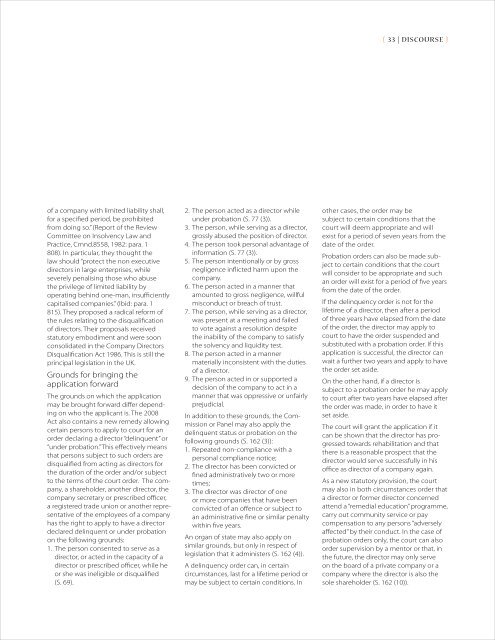November 2010 - University of Johannesburg
November 2010 - University of Johannesburg
November 2010 - University of Johannesburg
Create successful ePaper yourself
Turn your PDF publications into a flip-book with our unique Google optimized e-Paper software.
{ 33 | DISCOURSE }<strong>of</strong> a company with limited liability shall,for a specified period, be prohibitedfrom doing so.” (Report <strong>of</strong> the ReviewCommittee on Insolvency Law andPractice, Cmnd.8558, 1982: para. 1808). In particular, they thought thelaw should “protect the non executivedirectors in large enterprises, whileseverely penalising those who abusethe privilege <strong>of</strong> limited liability byoperating behind one-man, insufficientlycapitalised companies.” (Ibid: para. 1815). They proposed a radical reform <strong>of</strong>the rules relating to the disqualification<strong>of</strong> directors. Their proposals receivedstatutory embodiment and were soonconsolidated in the Company DirectorsDisqualification Act 1986. This is still theprincipal legislation in the UK.Grounds for bringing theapplication forwardThe grounds on which the applicationmay be brought forward differ dependingon who the applicant is. The 2008Act also contains a new remedy allowingcertain persons to apply to court for anorder declaring a director “delinquent” or“under probation.” This effectively meansthat persons subject to such orders aredisqualified from acting as directors forthe duration <strong>of</strong> the order and/or subjectto the terms <strong>of</strong> the court order. The company,a shareholder, another director, thecompany secretary or prescribed <strong>of</strong>ficer,a registered trade union or another representative<strong>of</strong> the employees <strong>of</strong> a companyhas the right to apply to have a directordeclared delinquent or under probationon the following grounds:1. The person consented to serve as adirector, or acted in the capacity <strong>of</strong> adirector or prescribed <strong>of</strong>ficer, while heor she was ineligible or disqualified(S. 69).2. The person acted as a director whileunder probation (S. 77 (3)).3. The person, while serving as a director,grossly abused the position <strong>of</strong> director.4. The person took personal advantage <strong>of</strong>information (S. 77 (3)).5. The person intentionally or by grossnegligence inflicted harm upon thecompany.6. The person acted in a manner thatamounted to gross negligence, willfulmisconduct or breach <strong>of</strong> trust.7. The person, while serving as a director,was present at a meeting and failedto vote against a resolution despitethe inability <strong>of</strong> the company to satisfythe solvency and liquidity test.8. The person acted in a mannermaterially inconsistent with the duties<strong>of</strong> a director.9. The person acted in or supported adecision <strong>of</strong> the company to act in amanner that was oppressive or unfairlyprejudicial.In addition to these grounds, the Commissionor Panel may also apply thedelinquent status or probation on thefollowing grounds (S. 162 (3)):1. Repeated non-compliance with apersonal compliance notice;2. The director has been convicted orfined administratively two or moretimes;3. The director was director <strong>of</strong> oneor more companies that have beenconvicted <strong>of</strong> an <strong>of</strong>fence or subject toan administrative fine or similar penaltywithin five years.An organ <strong>of</strong> state may also apply onsimilar grounds, but only in respect <strong>of</strong>legislation that it administers (S. 162 (4)).A delinquency order can, in certaincircumstances, last for a lifetime period ormay be subject to certain conditions. Inother cases, the order may besubject to certain conditions that thecourt will deem appropriate and willexist for a period <strong>of</strong> seven years from thedate <strong>of</strong> the order.Probation orders can also be made subjectto certain conditions that the courtwill consider to be appropriate and suchan order will exist for a period <strong>of</strong> five yearsfrom the date <strong>of</strong> the order.If the delinquency order is not for thelifetime <strong>of</strong> a director, then after a period<strong>of</strong> three years have elapsed from the date<strong>of</strong> the order, the director may apply tocourt to have the order suspended andsubstituted with a probation order. If thisapplication is successful, the director canwait a further two years and apply to havethe order set aside.On the other hand, if a director issubject to a probation order he may applyto court after two years have elapsed afterthe order was made, in order to have itset aside.The court will grant the application if itcan be shown that the director has progressedtowards rehabilitation and thatthere is a reasonable prospect that thedirector would serve successfully in his<strong>of</strong>fice as director <strong>of</strong> a company again.As a new statutory provision, the courtmay also in both circumstances order thata director or former director concernedattend a “remedial education” programme,carry out community service or paycompensation to any persons “adverselyaffected” by their conduct. In the case <strong>of</strong>probation orders only, the court can alsoorder supervision by a mentor or that, inthe future, the director may only serveon the board <strong>of</strong> a private company or acompany where the director is also thesole shareholder (S. 162 (10)).


